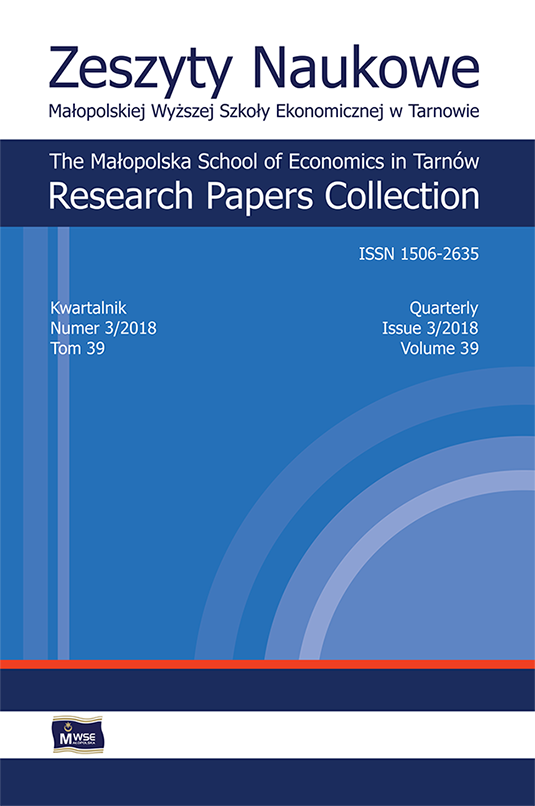Abstract
The starting point of considerations, presented in the article, is a thesis that a scale of innovative activity depends on innovative ability of enterprises and ability to exploit this potential in the process of introducing innovations. The article assumes the information that an innovative potential of an enterprise is considered to be social and economic features. What is more, these features are shaped during the development of an enterprise and they form the basis for the innovative activity of this enterprise. Those of them which are used constantly and effectively in the commercial process of introducing innovations have an impact on enterprise’s ability to establish innovations. The main aim of the article is to show the impact of cultural and organizational factors of enterprise’s innovation capacity on its business innovation. What is more, the article also provides results of an empirical research about the discussed impact. The main subject of the research is the recognition of cultural and organizational factors that have a permanent and significant influence on capacity for innovation, and then on innovative activity of an enterprise. The first part of the article includes presentations of cultural and organizational factors of innovative ability that create one of its determinants – the organization of work. The second part of the article talks about results of an empirical research. The results describe selected cultural and organizational factors of innovation capacity of enterprises that are located in the Małopolska Region. As the data presented in the article shows, cultural and organizational factors have a significant impact on the innovative capacity of enterprises. They also have an influence on innovative activity, measured by the number of innovations introduced.
References
Aniszewska, G. (2007). Kultura organizacyjna w zarządzaniu. Warszawa: PWE. ISBN 9788320816983.
View in Google Scholar
Baruk, J. (2006). Zarządzanie wiedzą i innowacjami. Poznań: Wydawnictwo Adam Marszałek. ISBN 9788374414067.
View in Google Scholar
Chesbrough, H. (2003). Open Innovation: The New Imperative for Creating and Profiting from Technology. Boston: Harvard Business School Press. ISBN 1578518377.
View in Google Scholar
Deal, T.E., Kennedy, A.A. (1983). Culture: A new look through old lenses. Journal of Applied Behavioral Science, 19(4), 498–505. DOI 10.1177/002188638301900411.
View in Google Scholar
Kline, S.J., Rosenberg, N. (1986). An overview of Innovation, W: R. Landau, N. Rosenberg (eds.). The Positive Sum Strategy: Harnessing Technology for Economic Growth (s. 275–305). Washington: National Academy Press. ISBN 0309036305.
View in Google Scholar
Kozioł, L., Wojtowicz, A., Karaś, A. (2014). Recognition of the determinants of innovation capacity of enterprises. Zeszyty Naukowe Małopolskiej Wyższej Szkoły Ekonomicznej w Tarnowie, 25(2), 107–116.
View in Google Scholar
Kozioł, L., Wojtowicz, A., Karaś, A. (2017). The Concept of the Innovative Tourism Enterprises Assessment Capability. W: V. Katsoni, A. Upadhya, A. Stratigea (eds.). Tourism, Culture and Heritage in a Smart Economy (s. 159–172). Cham: Springer. ISBN 9783319477329.
View in Google Scholar
Kozioł, L., Wojtowicz, A., Pyrek, R., (2014) Determinanty zdolności innowacyjnej przedsiębiorstw regionu Małopolski. Zeszyty Naukowe Małopolskiej Wyższej Szkoły Ekonomicznej w Tarnowie, 24(1), 113–122.
View in Google Scholar
Rothwell, R., Zegveld, W. (1985). Reindustrialization and technology. London: Longman. ISBN 0582902010.
View in Google Scholar
Serafin, K. (2015). Kultura organizacyjna jako element wspierający realizację strategii przedsiębiorstwa. Studia Ekonomiczne. Zeszyty Naukowe Uniwersytetu Ekonomicznego w Katowicach, 222(2), 87–100.
View in Google Scholar
Stoner, J., Wankel, C. (1997). Kierowanie. Warszawa: PWE. ISBN 8320808618.
View in Google Scholar
© Copyright by Małopolska School of Economics in Tarnów. The articles are available under the Creative Commons Attribution NonCommercial-NoDerivatives 4.0 International License


